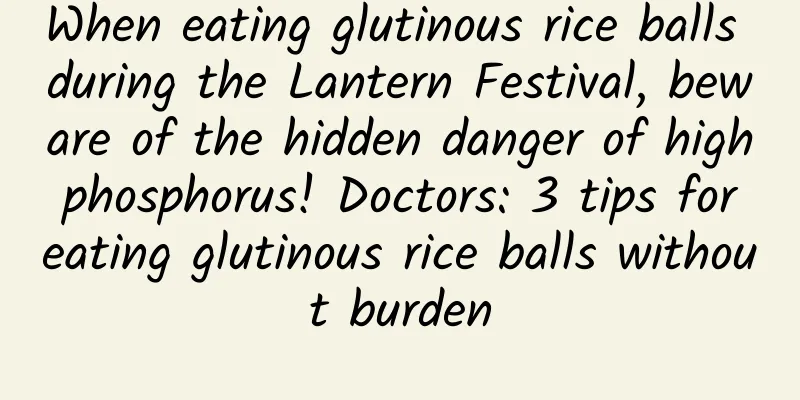When eating glutinous rice balls during the Lantern Festival, beware of the hidden danger of high phosphorus! Doctors: 3 tips for eating glutinous rice balls without burden

|
The Lantern Festival is approaching, and eating glutinous rice balls has become a traditional custom. However, glutinous rice balls, which symbolize "reunion", cannot be eaten without restraint. In addition to the well-known high starch, high oil and high sugar content, glutinous rice balls containing sesame, peanuts and sweet bean paste fillings also contain high phosphorus, which will impose a great burden on patients with kidney disease. In this regard, Kuo Kelin, director of the Renal Dialysis Center at Taipei Tzu Chi Hospital, reminded kidney patients that they hope they can celebrate the holidays happily while also taking care of their sick kidneys. The kidneys are important organs in the human body and are responsible for many functions. First, they have a detoxification function, which can filter metabolic waste and toxins in the blood; secondly, they have a drainage function, which regulates the balance of water in the body to prevent excess or deficiency, thereby maintaining stable blood pressure; in addition, the kidneys also have endocrine functions, secreting a variety of hormones, such as renin to regulate blood pressure, erythropoietin to stimulate red blood cell production, and activating vitamin D to promote calcium absorption. Since kidney disease patients have abnormal renal function, their daily dietary intake must be strictly controlled, especially those in the later stages of the disease, to prevent the kidneys from being overwhelmed. For example, daily sodium and potassium intake should be less than 2,000 mg, phosphorus intake should be less than 1,000 mg; refined sugar is limited to 25 grams. Director Guo Kelin pointed out: "Too much phosphorus can affect the kidneys and endocrine system, especially for kidney patients. When excessive intake occurs, the kidneys will not be able to effectively excrete the excess phosphorus, which will lead to hyperphosphatemia, further causing vascular calcification and cardiovascular disease risks. In addition, phosphorus will inhibit the activation of vitamin D, reduce calcium absorption, and cause an imbalance in calcium-phosphorus metabolism, thereby increasing the risk of osteoporosis and other bone diseases." If kidney patients take in too much phosphorus, calcium and phosphorus may be deposited in the skin, stimulating the peripheral nerves of the skin and causing acute and severe itching symptoms. Over time, problems such as bone fragility and vascular calcification will also occur. Rice dumplings carry a hidden risk of high phosphorus contentEating glutinous rice balls during the Lantern Festival is a traditional festival. Taking glutinous rice balls weighing about 20 grams each as an example, the phosphorus content of sesame filling is relatively high, about 30-40 mg per ball; peanut filling also has about 25-35 mg per ball; the phosphorus content of red bean paste filling is lower, about 15-25 mg per ball. However, there are also some foods containing phosphorus in our daily diet, so glutinous rice balls as snacks cannot be eaten without taboos. In this regard, Director Guo Kelin put forward three suggestions: Director Guo Kelin said that taking the glutinous rice balls weighing about 20 grams each as an example, the phosphorus content in the sesame filling is relatively high, about 30-40 mg per ball. Therefore, glutinous rice balls as snacks cannot be eaten without any taboos. (Photo courtesy of Taipei Tzu Chi Hospital) 3 tips for eating glutinous rice balls without burden1. When choosing glutinous rice balls, try to choose those without fillings made from pure glutinous rice or rice paste. 2. If you want to eat glutinous rice balls with fillings, limit it to 2 pieces a day and do not eat it for more than two consecutive days. 3. Kidney disease patients usually take calcium tablets and other phosphorus binders, so they should try to supplement calcium during the festive season. In addition to the three daily meals, it is also recommended to take it at snack times. Tangyuan is a non-low-protein staple food. Chronic kidney disease patients who have not entered the dialysis stage have considerations for limiting their protein intake, and nearly 50% of patients have diabetes. Therefore, Director Guo Kelin reminds kidney patients to regularly measure blood pressure and weight, observe urine color, take medication on time, and maintain a regular schedule. If you have any related concerns, it is recommended to consult a professional doctor or nutritionist so that you can celebrate the festival while taking care of your health. |
Recommend
Learn more about the causes of vaginitis
There are many factors in our lives that cause va...
Lose weight 123! Seize the golden period of losing weight one month after the New Year
During the Chinese New Year, people have more opp...
What to eat after abortion to get rid of blood stasis quickly? Should women eat more vegetables and fruits after abortion?
After a woman has just undergone an abortion, her...
Is the same diet suitable for everyone? Nutritionist: This is the most effective way for people with 3 different exercise intensities
The benefits of aerobic exercise and anaerobic ex...
Hospitals that provide surgical treatment for menopause
There are many hospitals that provide surgery for...
Is it not easy to gain weight by eating sweets during menstruation? (Down)
(Compiled by Huang Xiumei) Excessive body fat can...
Two major misunderstandings in the treatment of uterine fibroids
There are two common misunderstandings about the ...
What should I do if my period hasn’t come for more than three months at the age of 42?
What should I do if my period hasn’t come for mor...
How long does it take to cure cervical warts?
How long does it take to cure cervical warts? Cer...
How to better relieve dysmenorrhea? What are the methods to relieve dysmenorrhea?
Dysmenorrhea is a discomfort that many women expe...
Don’t be careless when treating cervical hypertrophy!
Cervical hypertrophy is a type of chronic cervici...
Neuroendocrine dysfunction is one of the causes of irregular menstruation
Many women have different degrees of menstrual ir...
Physical therapy for cervical erosion
Physical therapy for cervical erosion: Cervical e...
What are the obvious symptoms of vaginal candidiasis?
What is candidal vaginitis? What are the symptoms...
Does cervical erosion affect pregnancy? There is a certain correlation
Cervical erosion is a common disease. This diseas...









